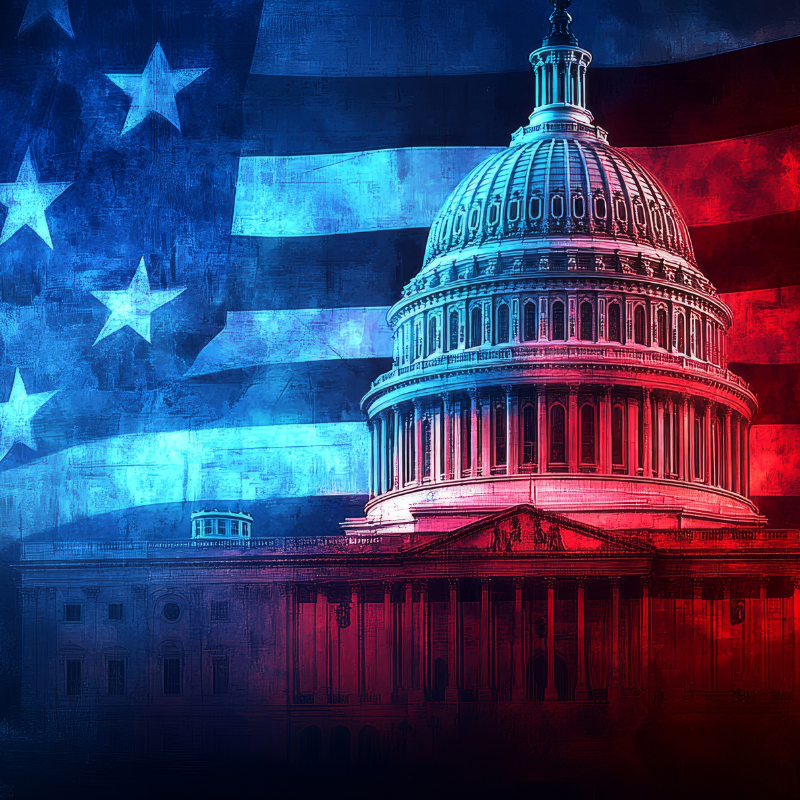On May 22, 2025, the House of Representatives adopted The One Big Beautiful Bill by a vote of 215-214.While the bill could face additional adjustments in the Senate before heading to the president’s desk, it provides the framework for 2025 tax reform. Here’s a breakdown of key provisions and their potential impact across various industries, including dealerships, industrial and consumer products, not-for-profits and real estate.
For a detailed overview of the key business income tax provisions, refer to the recently published article: House Passes Tax Reform Bill, Includes Multiple Business Provisions.
Proposed 2025 Tax Reform Applications for the Automotive Dealership Industry
Authored by: Joshua Keith, MBA
The One Big Beautiful Bill Act is now moving through the Senate, after passing in the House. While it may undergo additional changes before it goes to President Trump’s desk, the current version of the bill provides an initial outline for federal tax reform. That includes potential notable changes that would affect the dealership industry tax landscape.
Section 168(k) “Bonus” Depreciation
For the dealerships, this is a welcome change from a tax perspective, as it would allow for increased depreciation expense for new assets placed in service after January 19, 2025. This decreases the taxable net income of the entity from a federal tax perspective. However, depreciation laws vary by state. For example, Massachusetts, Rhode Island, New Jersey, New York, California and New Hampshire do not conform with Section 168(k) “Bonus” Depreciation, and therefore the depreciation expense related to this section must be “added back” on the respective state returns.
Section 179
The proposed changes to Section 179 benefit dealerships as they expand their operations, open new stores and renovate existing stores. The increased maximum threshold allows dealers to immediately expense 100% of the cost basis of the asset placed in service, subject to the Section 179 rules.
Updates to Section 163(j) and Adjusted Taxable Income (ATI)
Under the House bill’s proposed changes, a larger ATI, based on EBITDA, will allow auto dealerships to be less likely to have business interest expense exceed the 30% ATI limitation, and therefore be allowed to take bonus depreciation.This is a favorable change for dealerships as it could provide more interest expense and/or depreciation, subsequently lowering taxable income.
The House bill also modifies the definition of “motor vehicle” for purposes of floor plan financing interest and floor plan financing indebtedness. The new definition would state that “Any trailer or camper which is designed to provide temporary living quarters for recreational, camping or seasonal use and is designed to be towed by, or affixed to, a motor vehicle.”
Termination of Clean Energy Credits
Three federal income tax credits that the automotive industry often utilizes in relation to clean energy include the Clean Vehicle Credit, the Alternative Fuel Vehicle Refueling Property Credit and the Commercial Vehicle Credit.
For purposes of the customer clean vehicle credit, no credit will be allowed after December 31, 2026, and the only credit that will be allowed in the 2026 calendar year must be manufactured by an entity that has not sold 200,000 or more covered vehicles between December 31, 2009, and December 31, 2025. Anticipating that the qualified vehicles will be severely limited in 2026, automotive dealerships should expect that the vast amount of electric vehicle credits will no longer be available as of December 31, 2025.This could help with the administrative burden auto dealerships currently face regarding the proper reporting of the EV credit to their customers, as well as the process of transferring the EV credit from the individual customer to the dealership.
In addition, qualified commercial vehicles, including electric vehicles, placed in service by the dealership (i.e., service vehicles) will no longer be allowed a federal income tax credit for vehicles placed in service after December 31, 2025.However, if a binding written contract for the commercial vehicle was entered into prior to May 12, 2025, and placed in service prior to January 1, 2033, a commercial vehicle credit would still be allowed under the House bill.
The alternative fuel vehicle refueling property credit is no longer available for charging stations placed in service after December 31, 2025.
Key Takeaways for Auto Dealers
- 100% Bonus depreciation for assets placed in service 1/20/25 through 12/31/2029.
- 163(j) ATI calculation reverts to EBITDA – allowing more interest deductions and less chance of floor plan financing exception.
- Section 199A deduction increase to 23% from 20%.
- Termination of various energy credits, including the clean vehicle credit, the charging station credit and the commercial clean vehicle credit.
For more information on how this bill will impact the dealership industry, contact Withum’s Dealership Services Team.
One Big Beautiful Bill Implications for Industrial and Consumer Product Companies
Authored by: Ed Sadowski, CPA, Principal and Michael Pierce, CPA
On Thursday, May 22, 2025, the House of Representatives passed the One Big Beautiful Bill Act (H.R. 1, the “Bill”). It will now be considered by the U.S. Senate. The Bill has multiple provisions that have the potential to materially affect income taxes for manufacturing, distribution, logistics and consumer product companies. These provisions are designed to encourage U.S. investment and growth in manufacturing and distribution, making it easier for businesses in these sectors to expand and innovate. Below are some of the more notable provisions.
Immediate Expensing of Real Property
Currently, nonresidential real property is required to be depreciated over a 39-year period. The new provision would allow taxpayers to immediately deduct 100% of the cost of qualified production property, such as new factories, certain improvements to existing factories and certain other structures. Qualified production property is any nonresidential real property, used by the taxpayer as an integral part of the qualified production activity, based in the United States or a U.S. territory, is new and construction must begin after January 19, 2025 and before January 1, 2030. All property must be placed in service after the date of the bill is enacted and before January 1, 2034. A qualified production activity is one that manufactures, produces or refines tangible personal property, and it must be considered substantial. It cannot be used for offices, lodges or research activities.
Certain Manufacturers Can Avoid Interest Expense Limitation, 263A, and Utilize Cash Method of Accounting
Currently, taxpayers with average annual gross receipts below $25 million over the prior three taxable years, (indexed for inflation, the 2025 threshold is $31 million), are permitted to use the cash method of accounting, are exempt from the limitation on business interest deductibility, and are exempt from the capitalization of direct and indirect costs associated with inventory. The House bill increases the gross receipt threshold to $80 million for manufacturing taxpayers beginning after December 31, 2025. To qualify as a manufacturing taxpayer, a business must derive substantially all of its gross receipts (over the prior three taxable years) from the leases, rental, license, sale, exchange or other dispositions of tangible personal property produced or manufactured by the business.
Section 199A, Interest Expense Limitation, & Domestic Research and Experimental Expenditures
A few other notable provisions in the House bill are the Section 199A Pass Through Deduction increasing from 20% to 23%, although there is concern that this may be adjusted by the Senate.If a manufacturing company does not fall under the increased three-year gross receipts tests, and is subject to the Interest expense limitation calculation, adjusted taxable income would again include an addback for depreciation, amortization or depletion, when applying the 30% limitation.The ability to add back depreciation, amortization or depletion, and therefore obtain a larger interest expense deduction, would be availablefor taxable years after December 31, 2024, and before January 1, 2030. Lastly, the Bill provides that domestic research and experimental expenses can be fully deductible for expenditures paid or incurred in taxable years beginning after December 31, 2024.
For more information on how this bill will impact manufacturing, distribution, logistics and consumer product companies, contact Withum’s Industrial and Consumer Products Services Team.
Major Changes Affecting Nonprofits and Other Tax-Exempt Organizations Proposed in the One, Big, Beautiful Tax Bill
Authored by: Israel Tannenbaum, CPA, Partner
In our recent article, Major Changes Affecting Nonprofits and Other Tax-Exempt Organizations Proposed in the One, Big, Beautiful Tax Bill, we break down the major provisions that tax-exempt organizations need to be aware of.
Exempt organizations should closely follow the progress of the One, Big, Beautiful Tax Bill as it moves through Congress. Staying informed and preparing – from adjusting budgets for new taxes to communicating new giving incentives to donors – will help exempt organizations navigate the changes if and when this legislation becomes law.
For more information on how this bill will impact nonprofits and other tax-exempt organizations, contact Withum’s Not-for-Profit and Education Services Team.
House Ways and Means Committee Unveils Tax Reform Bill With Business and Real Estate Provisions
Authored by: Michael Hurwitz, CPA, Partner
The House proposal specifically impacts the real estate industry regarding the Opportunity Zone program. The current law allows investors to defer capital gains by reinvesting in designated low-income communities. The existing regulations are set to expire on December 31, 2026. The House proposal provides a second round of Opportunity Zones beginning on January 1, 2027, and ending on December 31, 2033.
Under the new provisions, deferred capital gains realized post December 31, 2026 would be recognized on December 31, 2033, instead of December 31, 2026. Additionally, the second round of the opportunity zones narrows the definition of eligible low-income communities. At least one-third of designated Opportunity Zones (or a percentage equal to the state’s rural population, whichever is greater) would be required to be in rural areas. The proposal shifts focus toward supporting rural development by reducing the substantial improvement requirement from 100% to 50% of the adjusted basis for qualifying properties. However, contiguous tracts would no longer be eligible for designation as Opportunity Zones.
The proposal allows a basis step-up incentive for Opportunity Zone investments made after 2026.Those holding investments for at least five years would receive a 10% basis step-up on deferred gains, while investments in Qualified Rural Opportunity Funds (QROFs) would be eligible for a 30% basis step-up. The bill also expands investment eligibility beyond capital gains by allowing up to $10,000 of post-tax ordinary income to qualify for deferral under the Opportunity Zone rules, subject to specified limitations.
To enhance oversight, new transparency and reporting requirements would be established to ensure investments align with economic development goals. These reporting requirements include the issuance of annual public reports detailing total assets, investment locations and types, employment impact, and residential development data. Specific reporting mandates for QROFs and strict compliance measures for Qualified Opportunity Funds and Opportunity Zone businesses, including penalties for noncompliance, would also be implemented.
For more information on how this bill will impact the real estate industry, contact Withum’s Real Estate Services Team.
Get the Latest Tax and Legislative Developments
Withum’s National Tax Policy and Legislative Updates Resource Center is the go-to hub for the latest changes in tax laws and legislative developments from Washington, D.C. Our team closely monitors and analyzes proposed tax legislation, providing individuals and businesses with timely insights to help navigate the evolving tax landscape.
Contact Us
For more information on this topic, please contact a member of Withum’s Business Tax Services Team.
Disclaimer: The tax reform provisions outlined in these articles are still awaiting approval by the Senate and signature from President Trump. The provisions are not currently effective in the law. Please consult your tax advisor regarding the proposed changes passed by the House of Representatives.










